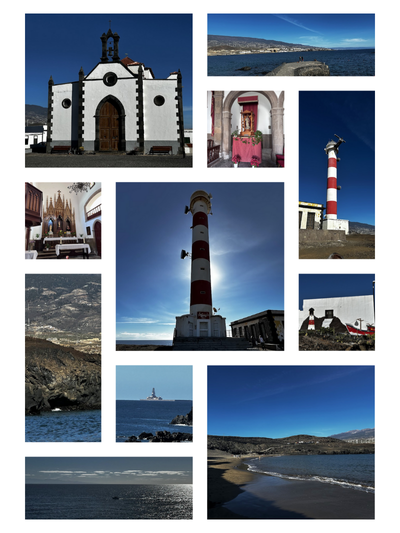
What to see in Punta de Abona: Complete Guide to a Secret Destination in Tenerife
Introduction: Discover What to See in Punta de Abona
If you are wondering what to see in Punta de Abonayou have found the ultimate guide to explore one of the most fascinating places in the south of Tenerife. Located on the southeast coast of the island, this hidden destination offers a unique experience that goes beyond the typical sightseeing tours.
Basic Information
Location and Key Data
What to see in Punta de Abona begins with an understanding of its privileged location:
- Location: Southeast coast of Tenerife, municipality of Arico, Canary Islands, Spain
- Coordinates: 28.1559° N, 16.4348° W
- Distance from Santa Cruz de Tenerife: 35 km
- Distance from tourist centres in the south: 20-25 km
- Altitude: 0-35 metres above sea level
- Population: Sparsely populated, less than 50 permanent residents
Transport and Access: What You Need to Know
Arrival Options
For what to see in Punta de Abona, you will need to plan your transport:
By Car
- Main route: TF-1 motorway
- Diversion: Exit Porís de Abona (Exit 24)
- Parking: Limited, free places near the lighthouse and the beach
- Road quality: Narrow and winding from the main road
Public Transport
- Bus line: TITSA line 111 (Santa Cruz - Médano - Los Cristianos)
- Nearest stop: Porís de Abona, approx. 3 km on foot
- Frequency: Hourly on weekdays, less frequent on weekends
Climatic conditions
Unique Climate of Punta de Abona
What to see in Punta de Abona is strongly influenced by its microclimate:
- Average annual temperature: 22°C
- Warmest month: August (average 26°C)
- Coldest month: January (average 19°C)
- Annual precipitation: 100-150 mm
- Sunshine hours: More than 3000 hours on average per year
- Prevailing wind: North-easterly trade winds
Best Times to Visit
- High season: June-September
- Mid-season: March-May, October-November
- Low season: December-February
- Best time to visit: September-November (pleasant temperature, less tourists)
Historical Overview
Historical Periods of Punta de Abona
Early Period
- Used by Guanches for fishing activities.
- Fishing implements date from the 5th-10th centuries AD.
- Important fishing centre in the Guanche culture
Colonisation and Development
- After the Spanish conquest (late 15th century)
- Small fishing settlement in the 18th-19th centuries
- 1902: Construction of Punta de Abona lighthouse
20th-21st centuries
- 1940s: Planning of the Abades military and health complex
- 1945-1960: Abandonment of the Abades project
- 1960-2002: Military use of Abades
- 2002-present: Gradual tourist discovery
Main Attractions
1. Punta de Abona Lighthouse
Details of the lighthouse:
- Year of construction: 1902
- Height: 32 metres
- Scope: 14 nautical miles (approx. 26 km)
- Signalling pattern: Two white flashes every 10 seconds
- Architect: Antonio Marrero y Hernández
- Material: Local volcanic stone and concrete
- Accessibility: Outside free, inside not open to visitors
2. Playa Grande
Characteristics of the beach:
- Type: Volcanic sand beach
- Length: Approximately 800 metres
- Width: 20-50 metres
- Services: Minimal
- Access: Asphalt road and dirt road
- Parking: Limited number of places
3. Ruins of Abades
Details of the complex:
- Size: Approximately 30 hectares
- Construction period: 1942-1945
- Original function: Hospital complex
- Architect: José Enrique Marrero Regalado
- Current status: Abandoned, partially deteriorated
- Main buildings: Church, hospital, administrative centre
Ecology and Conservation
Characteristic Flora
- Sweet Tabaiba
- Canary Island teasel
- Barrilla
- Gorse
- Cosco
Fauna
- Terrestrial: Atlantic lizard, Canary Island gecko
- Birds: Petrels, gulls, peregrine falcons
- Marina: Fishes, molluscs, occasionally cetaceans
Activities
Aquatics
- Diving
- Snorkel
- Sport fishing
- Swimming
Terrestrial
- Hiking
- Birdwatching
- Photography
- Geological excursions
Practical Information
Emergencies
- Emergency number: 112
- Nearest medical centre: Porís de Abona (3 km)
- Nearest hospital: Hospital del Sur, Arona (40 km)
Local Services
- No ATMs
- Limited shops
- Variable mobile coverage
Nearby Attractions
- Porís de Abona
- Montana Grande
- El Médano
- Red Mountain Conservation Area
- Candelaria
- Pyramids of Güímar
Sustainability
Environmental Challenges
- Coastal erosion
- Climate change
- Invasive species
- Limited water resources
Protection Initiatives
- Coastal clean-up programme
- Heritage protection
- Biodiversity monitoring
- Promotion of sustainable tourism
Conclusion
What to see in Punta de Abona is much more than just a tourist destination. It is a journey through the history, nature and culture of Tenerife, a place where every corner tells a unique story.
